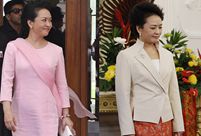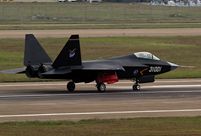 Bikini show in 2014 China Final of Miss Tourism World
Bikini show in 2014 China Final of Miss Tourism World
 Close-up view of August Aerobatic Team
Close-up view of August Aerobatic Team
 Goddesses married in 2014
Goddesses married in 2014
 Polar region photos raise worldwide awareness of global warming
Polar region photos raise worldwide awareness of global warming
 Get off at the last stop — Beijing Subway in vision
Get off at the last stop — Beijing Subway in vision
 Top 100 beauties in the world!
Top 100 beauties in the world!
 Gallery: Who is the most beautiful one?
Gallery: Who is the most beautiful one?
 If you like autumn, put your hands in the air!
If you like autumn, put your hands in the air!
 Fan Bingbing's "Queen style" in new play
Fan Bingbing's "Queen style" in new play
 Lingerie show at 2014 Miss China
Lingerie show at 2014 Miss China
BEIJING, Dec. 14 -- The Shanghai Cooperation Organization (SCO) is generally viewed as a security bloc, but the changing circumstances in the region has made economic cooperation an equally important strategic goal.
The upcoming prime ministers' meeting of the SCO, which consists of China, Russia and four Central Asian countries, is likely to unveil new measures to boost economic integration among member states.
In fact, the six-member organization has been expanding fast into economy and trade, although security issues remain at the top of the SCO agenda.
The bloc has created mechanisms such as the SCO Business Council and SCO Interbank Consortium. Trade volume between China and other member states jumped from 12.1 billion U.S. dollars in 2001 to 130 billion dollars in 2013. Their economic output totaled 14.9 percent of the world economy, compared with just 4.8 percent in 2001.
The scale and level of multilateral economic cooperation among member states, however, remain underdeveloped compared with their tightening security relations. Covering about three-fifths of the Eurasia landmass and a quarter of the world's population, the bloc could unleash great potential in trade and investment to benefit the lives of billions of people.
As is the case with many multilateral mechanisms, a strong economy serves as a sound basis for broad-based cooperation. Joint initiatives in energy, infrastructure, agriculture and finance would not only keep up the momentum of the regional bloc, but also help build consensus among member states.
Given multiple risks and uncertainties in the world economy, such as looming deflation, tumbling energy prices, and thorny geo-political issues, SCO members should join hands to prop up growth.
A good opportunity is China's proposal of building a Silk Road Economic Belt. The idea was first brought up by President Xi Jinping during a visit to Central Asia last year, and has since witnessed China's tangible commitments, including the 40-billion-dollar New Silk Road Fund set up in November to directly support the initiative.
Boosting connectivity along the ancient Silk Road will bring strategic benefits to countries in the SCO. The establishment of a Eurasian transport corridor in the spirit of the ancient Silk Road will spur trade and investment between Asia, Europe, Middle East and Africa.
This year's prime ministers' meeting is expected to implement the consensus reached by presidents of the member states in September, and make specific arrangement on security and economic cooperation.
Security and economic cooperation, the two "wheels" of the regional bloc, will reinforce each other in the pursuit of long-term peace, stability and prosperity in the region.
More than a decade after its inception, the SCO has become a key part in the security system of the Eurasia continent. There is much to expect from its economic action.
 20 years on: Relocated Three Gorges residents through lens
20 years on: Relocated Three Gorges residents through lens PLA HK Garrison veterans leave behind beautiful smiles
PLA HK Garrison veterans leave behind beautiful smiles Representative beauties of each province in China
Representative beauties of each province in China Chestnut girl goes viral online
Chestnut girl goes viral online Victoria's Secret Fashion Show
Victoria's Secret Fashion Show In photos: Bright and brave female soldier of PLA
In photos: Bright and brave female soldier of PLA China's charming first lady
China's charming first lady Excellent photos of Zhuhai Air Show
Excellent photos of Zhuhai Air Show China's heavyweight aircraft
China's heavyweight aircraft Society needs consensus on street politics
Society needs consensus on street politics Policy bank plan gets mixed reaction
Policy bank plan gets mixed reaction  Shopaholics
Shopaholics  Hungry moments
Hungry momentsDay|Week|Month